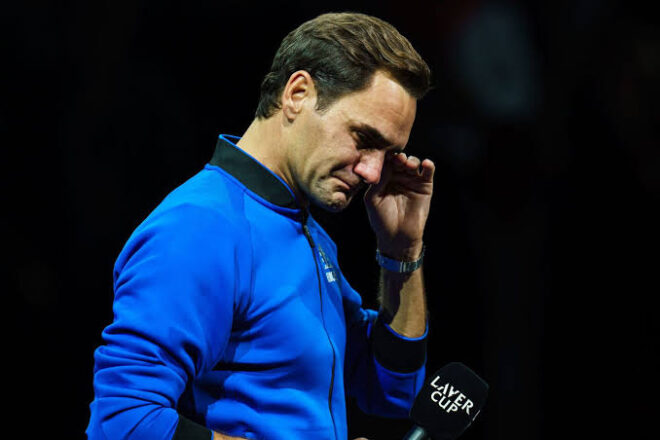
Roger Federer, a name synonymous with tennis greatness, has not only redefined the sport but has also become a global icon. Born on August 8, 1981, in Basel, Switzerland, Federer’s journey to becoming one of the greatest players in tennis history is a compelling narrative of talent, perseverance, and sportsmanship.
Federer was introduced to tennis at an early age. His parents, Robert and Lynette Federer, encouraged him to play sports, and by the age of eight, he had already joined a local tennis club. His prodigious talent became evident when he won his first national championship at the age of 14. However, balancing academics and tennis was a challenge, and Federer made the bold decision to focus solely on his tennis career.
In 1998, Federer turned professional, embarking on a journey that would change the course of tennis. His early years on the ATP Tour were marked by ups and downs, but Federer’s natural ability, combined with his dedication to the sport, quickly saw him rise through the ranks. By 2001, he reached the quarterfinals of Wimbledon, signaling the beginning of an extraordinary career.
Federer’s breakthrough came in 2003 when he won his first Grand Slam title at Wimbledon. His elegant playing style, characterized by a powerful serve, precise groundstrokes, and an uncanny ability to read the game, set him apart from his peers. Over the next few years, he solidified his position at the top of the tennis world, winning multiple Grand Slam titles and breaking records that had stood for decades.
The period from 2004 to 2007 is often regarded as Federer’s peak. He won three out of the four Grand Slam tournaments in 2004, including Wimbledon, the US Open, and the Australian Open. His incredible success continued as he amassed a total of 12 Grand Slam titles by 2007, showcasing an unprecedented level of consistency and dominance in the sport.
One of the defining aspects of Federer’s career has been his rivalries with other tennis greats, particularly Rafael Nadal and Novak Djokovic. The contrasting styles of Federer and Nadal, with Federer’s fluid grace versus Nadal’s relentless power and spin, created some of the most memorable matches in tennis history. Their rivalry reached its zenith during the Wimbledon finals, where they faced each other multiple times, each match a testament to their incredible skill and determination.
Similarly, the rivalry with Djokovic added another layer of intrigue to Federer’s career. Their encounters were often tightly contested, with matches stretching into five sets and showcasing the mental and physical endurance required at the highest level of the sport. These rivalries not only elevated Federer’s game but also contributed to the popularity of tennis globally, as fans eagerly anticipated their encounters.
Federer’s Grand Slam record speaks volumes about his impact on the sport. As of 2021, he has won 20 Grand Slam titles, a record that ties him with Nadal and Djokovic. His wins at Wimbledon, the US Open, the Australian Open, and the French Open highlight his versatility and ability to perform on different surfaces. Federer’s playing style, which combines classical techniques with modern athleticism, has inspired a new generation of players, making him a revered figure in tennis circles.
Federer’s influence extends far beyond the tennis court. Known for his sportsmanship and humility, he has become a role model for aspiring athletes and fans alike. In 2003, he founded the Roger Federer Foundation, which aims to provide educational opportunities for children in Africa and Switzerland. His philanthropic efforts have positively impacted countless lives, emphasizing the importance of education and access to resources.
Federer’s charm and charisma have also made him a sought-after ambassador for various brands and charitable initiatives. His collaborations with organizations like UNICEF and the Laureus Sport for Good Foundation have further solidified his status as a global ambassador for sports and social causes.
As Federer approached the latter stages of his career, injuries began to take their toll. He underwent multiple surgeries on his knee and faced challenges in maintaining his fitness level. Despite these setbacks, Federer continued to compete at a high level, showcasing his resilience and love for the game. His emotional farewell at Wimbledon in 2021 after losing in the quarterfinals marked a poignant moment for fans and the sport alike.
In September 2022, Federer announced his retirement from professional tennis, bringing an end to an illustrious career that spanned over two decades. His final appearance at the Laver Cup, alongside long-time rival Nadal, was a fitting tribute to his legacy and the friendships he forged throughout his career.
Roger Federer’s impact on tennis is immeasurable. He has transcended the sport, becoming a cultural icon and a symbol of excellence. His graceful playing style, mental fortitude, and sportsmanship have set a benchmark for future generations of athletes. Beyond the records and titles, Federer’s influence lies in his ability to inspire and uplift those around him, making him not just a champion but a beloved figure in the world of sports.
As tennis looks to the future, Federer’s legacy will undoubtedly endure, reminding fans of the beauty and passion that define the sport. His contributions to tennis and his philanthropic efforts ensure that his impact will be felt for years to come, leaving an indelible mark on the hearts of millions around the globe.